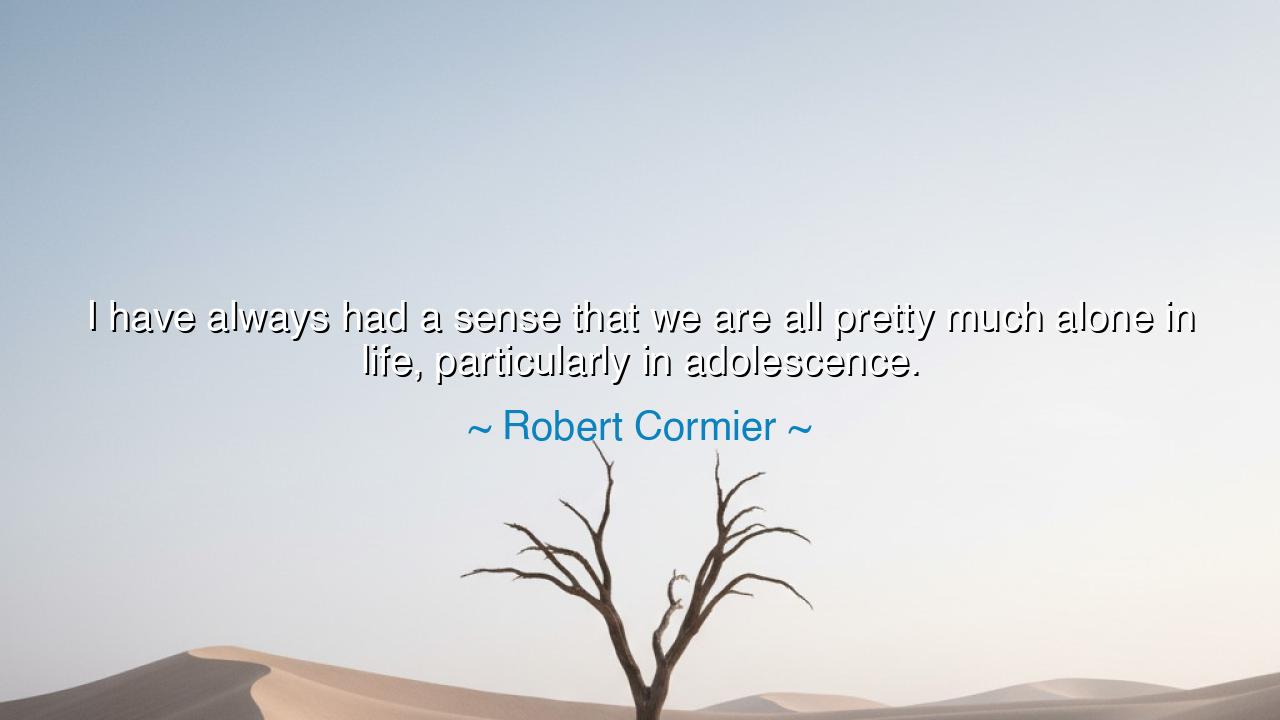
I have always had a sense that we are all pretty much alone in
I have always had a sense that we are all pretty much alone in life, particularly in adolescence.






“I have always had a sense that we are all pretty much alone in life, particularly in adolescence.” — thus spoke Robert Cormier, the chronicler of the quiet storms that rage within the hearts of the young. In these words, he unveils a truth both tender and terrible: that loneliness is the secret companion of growing up, and that in the journey from innocence to understanding, each soul must pass through its own shadow. It is not cruelty that isolates us, but the awakening of self-awareness — that moment when a person begins to see the world not through borrowed eyes, but through their own, and realizes, perhaps for the first time, that no one else can truly see what they see or feel what they feel.
The origin of this thought lies deep within Cormier’s works, especially The Chocolate War, where the young protagonist Jerry Renault stands against conformity and finds himself abandoned by those who once stood beside him. Cormier, himself a man of great empathy, understood the solitude that lives in adolescence — that strange season when the heart yearns for belonging but the mind hungers for independence. He saw that to grow is to separate, and to separate is to feel alone. Thus his words are not merely about isolation, but about the inevitable solitude of becoming.
When Cormier says, “we are all pretty much alone in life,” he does not mean that we are unloved or unwanted, but that each life is lived from the inside out, enclosed by its own consciousness. Even in laughter, even in love, there remains a space no one can cross — the inner chamber of thought and feeling that belongs to each soul alone. This solitude becomes most visible in adolescence, when the child begins to question the world he once accepted without doubt. The faces of parents, teachers, and friends, once so certain, begin to blur; the young person begins to ask, Who am I, and where do I belong? It is a sacred and terrifying question, one that must be asked alone.
Consider the story of Anne Frank, a girl hidden in a small attic while the world outside descended into war. Though surrounded by others, her truest companion was her diary — the one place where her voice could be free, where her soul could breathe without fear. In her solitude, she wrote not with despair, but with courage. “I feel the suffering of millions,” she said, “and yet, when I look up at the sky, I somehow feel that everything will change for the better.” Her loneliness did not destroy her; it revealed her strength. This is the heart of Cormier’s meaning: that solitude, though painful, can awaken depth, compassion, and truth.
Yet, most flee from loneliness as though it were a disease. We fill our lives with noise, distractions, endless conversation, all to avoid hearing the echo of our own hearts. But the artist, the thinker, the one who dares to live consciously — they learn what Cormier knew: that to face one’s aloneness is to know oneself. For solitude is not emptiness; it is the forge of identity. The adolescent who endures it without despair grows into an adult who can love without losing himself, who can stand alone without pride and walk among others without fear.
There is a paradox here. We are all alone, yet it is through acknowledging that aloneness that we truly connect. The most profound friendships and loves are not built on the illusion of merging souls, but on the recognition of two separate beings who choose to walk together. In this way, Cormier’s truth is not one of despair but of dignity. It teaches that loneliness is not the enemy of life, but part of its design — the shadow that makes the light of connection precious.
The lesson, then, is to accept solitude as a companion, not a curse. In youth, when it first descends, do not run from it; listen to what it teaches. Let it sharpen your vision and deepen your compassion. Speak honestly with yourself; write, create, dream — for these are bridges across the inner distance. And when you meet others, do not demand that they fill your emptiness; share your strength with them instead.
So let Robert Cormier’s words echo in your soul: “We are all pretty much alone in life, particularly in adolescence.” Accept this not as a lament, but as an invitation — to know yourself, to cherish others, and to live authentically even in the spaces where no one else can follow. For only those who have faced their own solitude can truly stand beside another with open eyes and an unafraid heart.






AAdministratorAdministrator
Welcome, honored guests. Please leave a comment, we will respond soon